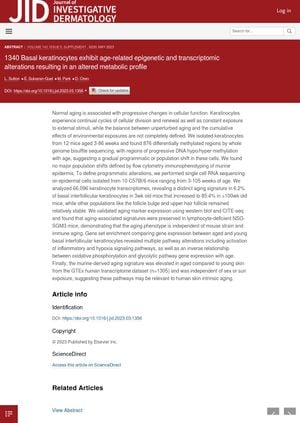Basal Keratinocytes Exhibit Age-Related Epigenetic and Transcriptomic Alterations Resulting in an Altered Metabolic Profile
April 2023
in “
Journal of Investigative Dermatology
”

TLDR Aging changes skin cells, leading to different DNA methylation and gene activity, affecting cell metabolism and aging signs.
The study investigated the effects of aging on keratinocytes, the predominant cell type in the skin's outermost layer. Keratinocytes from 12 mice aged 3-86 weeks were isolated and analyzed, revealing 876 differentially methylated regions, indicating age-related DNA hypo/hyper-methylation. Single cell RNA sequencing on epidermal cells from 10 mice aged 3-105 weeks showed a distinct aging signature in 6.2% of basal interfollicular keratinocytes in 3-week-old mice, increasing to 85.4% in mice older than 100 weeks. This aging signature was also found in lymphocyte-deficient NSG-SGM3 mice, suggesting it's independent of mouse strain and immune aging. Pathway alterations were observed in aged keratinocytes, including activation of inflammatory and hypoxia signaling pathways, and an inverse relationship between oxidative phosphorylation and glycolytic pathway gene expression. The murine-derived aging signature was also found in aged human skin, independent of sex or sun exposure, suggesting its relevance to human skin intrinsic aging.






